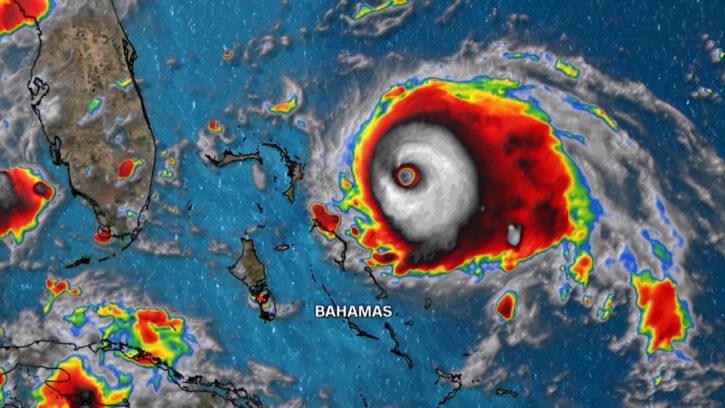
Hurricane Dorian – the strongest storm anywhere on the planet this year – is leaving "catastrophic damage" in its wake as it makes its way across the Bahamas. The Category 5 storm made landfall on the eastern end of Grand Bahama Island on Sunday night and will continue to pound the island for most of Monday as it creeps toward the southeastern US.
The storm had winds of 165 mph while it was 115 miles east of West Palm Beach early on Monday. It is expected to begin trudging toward the mainland US later in the day, the National Hurricane Center said. The massive storm will get “dangerously close” to Florida's east coast on Monday night through Wednesday evening, the center said.
But the state has already begun to feel Dorian's effects, CNN Meteorologist Robert Shackelford said, and winds will continue to pick up throughout Monday as it inches closer.
It will be a slow arrival, as Dorian is trekking along at an average of 3 mph, about walking pace, CNN meteorologist Brandon Miller said.
The Bahamas are taking the brunt now
As it pummelled islands in the Bahamas, the hurricane left behind “catastrophic damage,” Hope Town Volunteer Fire & Rescue said on Facebook. Damage was reported in Elbow Cay, Man-o-War and Marsh Harbour in the Abaco Islands, where buildings were destroyed and many were partially submerged, with water flooding all around them.
The Abaco Islands are a group of islands and barrier cays in the northern Bahamas, east of southern Florida. Dorian made landfall there as a Category 5 hurricane just after noon on Sunday.
The northwestern Bahamas will be drenched in up to 24 inches of rain, with some areas expecting up to 30 inches of water, the hurricane center said.
As the storm spun over Grand Bahama Island, the hurricane center said “catastrophic storm surge flooding” was likely.
This is the first time a Category 5 storm has hit the Bahamas since Hurricane Andrew in 1992.
Will it make landfall in the US?
The terrifying storm may be making its way toward the East Coast, but it's still unclear if Dorian will make landfall and where on the mainland US. The hurricane's forecasted track shifted east Friday, making a Florida landfall less likely, but not impossible.
Models now show the storm skirting along Florida's coast Tuesday and then next to Georgia late Tuesday and into Wednesday. But just because the center of the storm may not hit land doesn't mean there won't be damage. Early on Monday, hurricane-force winds from the storm extended outward up to 45 miles.
Heavy rains and life-threatening floods are expected in parts of the southeast and lower mid-Atlantic US later this week. The storm will dump up to 6 inches of rain in Florida through Georgia.
A coastal flood advisory was issued early Monday for South Carolina and Georgia by the National Weather Service, which warned of a high rip current, and the hurricane center warned of an “increasing likelihood” of strong winds and dangerous storm surge along the coasts of Georgia, South Carolina and North Carolina later this week.




